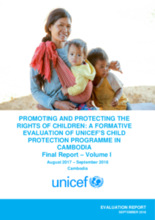UNICEF Cambodia’s Child Protection Programme 2016-2018 aimed to achieve the outcome that “by 2018, girls and boys vulnerable to and exposed to violence and those separated from their family, or at risk of separation, are increasingly protected by the institutional and legislative frameworks, quality services, and a supportive community environment.” The Programme has taken a system-strengthening approach at the levels of national and sub-national institutions; service providers; and children, families and communities.
Further, the objective of the evaluation was to provide evidence that can help strengthen performance and accountability with UNICEF’s work with the Royal Government of Cambodia and the myriad other authorities and organizations involved in child protection. The evaluation has reconstructed the theory of change, reviewed results of the Programme, assessed UNICEF’s leadership in the sector and examined linkages between outputs. The primary users of the evaluation are mainly UNICEF and the Government.
This evaluation explores the effectiveness of UNICEF Cambodia's reintegration and prevention programming, including efforts to reintegrate children from institutional care and into family-based care.
Summary of main findings regarding reintegration: UNICEF’s mobilisation of partnerships to promote the reintegration of children out of RCIs was found to be highly effective. In particular, UNICEF has achieved significant buy-in and commitment from the RGC towards the goal of promoting family-based care for the thousands of children living in RCIs across Cambodia, including the setting of a target to reintegrate 30 per cent of children living in RCIs into family-based care by 2018. Once the Government made this commitment, UNICEF then mobilised partnerships and resources, and provided technical support to Government to achieve these goals and to do so safely. This is evidenced by a number of key policy achievements at the national level.
Overall, the evaluation findings support the position that deinstitutionalisation of children, and the promotion of reunification and placements in the community, is a vital component of strengthening child protection in Cambodia. The majority of children included in the evaluation said that they felt safer and happier following placement and were pleased to be reunited with their families, and or communities.
Nevertheless, there is more work to be done on how reintegration is managed in practice. In particular, there is an urgent need to strengthen social work practices regarding family assessment and risk analysis, before a decision is made to reintegrate a child, as well as regular follow-up and review after placement has occurred to ensure the ongoing safety and well-being of children undergoing reintegration. The issue of children who cannot be located or contacted remains a matter of concern, and consideration needs to be given to the desirability of reunifying children whose parents are likely to migrate for work, or where the child may be encouraged to migrate by the parent as it has been shown to be almost impossible to monitor these children as required for the programme.
The Programme needs to focus on providing tailored, specialist and intensive social work support to the most vulnerable children and families, including younger children, girls, children with disabilities and children living in poorer households, to ensure that these children can benefit equally from the reintegration reforms, and have the opportunity to be safely cared for in a family or community environment. There is also a need to put in place contingency plans for children whose reunification or community-based placement breaks down or fails.
While recipients expressed satisfaction, support for children in the process of reintegration was found to be minimal and short-term, leading in some cases to family migration and a need for the child to earn money rather than attend school.
Volume Two of this report includes all of the annexes referred to in this first volume.

